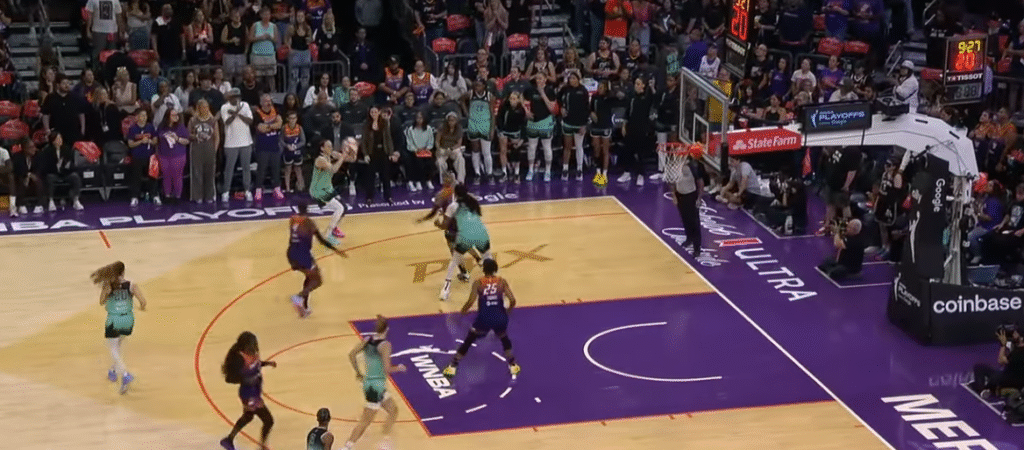Breanna Stewart’s free agency is more than just another offseason story; it’s a sign of how athletes are taking back control of their careers. Stewart has maintained her position as the focal point of negotiations by opting for one-year contracts, which will enable her to react strategically as the WNBA completes a new collective bargaining agreement. Her strategy has proven to be extremely successful, especially in increasing her influence and leverage in influencing the larger discussion surrounding player empowerment.
Stewart’s decision to sign shorter contracts is remarkably similar to the strategic actions once taken by LeBron James, who is renowned for having perfected flexibility to optimize power and earnings. Given that the upcoming CBA is anticipated to drastically alter player salaries, endorsement deals, and team-building techniques, Stewart finds the strategy especially advantageous. She puts herself in a position to gain immediate advantages from a system that is anticipated to significantly improve in terms of financial opportunity and fairness by waiting.
It is impossible to overestimate the Liberty’s dependence on Stewart. As evidenced by their 2024 championship run, New York has changed from a talented roster to a serious contender since she signed in 2023. In every aspect of the team’s identity, from off-court leadership to on-court scoring and defense, Stewart’s presence has been remarkably evident. Her ability to stabilize a locker room through presence, accountability, and unwavering drive is harder to quantify than her efficiency, which is demonstrated by her averages of 21.8 points and almost nine rebounds per game.
Table of Bio Data and Professional Information
| Category | Details |
|---|---|
| Full Name | Breanna Mackenzie Stewart |
| Date of Birth | August 27, 1994, Syracuse, New York, U.S. |
| Age | 31 (as of 2025) |
| Height | 6 ft 4 in (1.93 m) |
| Position | Forward |
| Current Team | New York Liberty (WNBA) |
| Contract Status | Signed one-year $208,400 contract with Liberty (March 2025); free agent after season |
| College | University of Connecticut (UConn) |
| WNBA Debut | 2016, Seattle Storm |
| Career Highlights | 2× WNBA MVP, 2× WNBA Finals MVP, 3× WNBA Champion, 6× WNBA All-Star, 3× Olympic Gold Medalist |
| Known For | Versatile scoring, defensive dominance, outspoken advocate for women’s sports and player empowerment |
| Reference | WNBA Official Release: https://www.wnba.com/news/new-york-liberty-re-sign-breanna-stewart |

But the 2025 season showed how easily momentum can stall. The Liberty’s rhythm was upset by injuries and a lack of chemistry after they had won nine straight games to begin the season. As a result, they finished 18-17 before losing to Phoenix in the playoffs. It served as a sobering reminder of how weak even superteams can be. Stewart’s postgame statement, however, was straightforward: “I’m coming back.” Her devotion to a team that has centered its identity around her was reaffirmed by those three words, which were remarkably straightforward but incredibly comforting. They also gave teammates and fans clarity.
An element of intrigue is added by her relationship with Sabrina Ionescu. Stewart’s demand that Ionescu reaffirm her own commitment sparked an impromptu but symbolic moment that demonstrated how elite athletes now hold one another accountable in ways that are both deeply personal and highly adaptable for team culture. In addition to being athletic, their collaboration represents a new wave of female athletes who demand excellence and unity.
Stewart’s free agency is particularly interesting because it has applications outside of basketball. She represents a larger struggle for equality and recognition in professional sports, much like Serena Williams in tennis or Megan Rapinoe in soccer. Her choice to align contracts with labor negotiations effectively highlights systemic injustices, and her prominence guarantees that the message reaches both WNBA fans and general sports fans. This type of approach is especially creative since it transforms individual contracts into forums for group advancement.
Another dimension is added by the financial context. Although Stewart’s one-year contract, worth $208,400, is the highest salary permitted in the WNBA, it is still remarkably inexpensive when compared to NBA norms. This discrepancy reflects an industry that is still working to match compensation to impact and performance, and it goes beyond simple statistics. Stewart is indicating that she will not make a long-term commitment until the league shows substantial progress in fairly valuing its talent by arranging her contracts year after year.
Rehiring Stewart was the Liberty’s “top priority,” according to general manager Jonathan Kolb. His statements are a very trustworthy way to gauge the organization’s goals. The Liberty are aware that their competitiveness and identity would be greatly diminished in Stewart’s absence. Her importance is also acknowledged by her fans, who frequently liken her to Lionel Messi in international football or Patrick Mahomes in the NFL—figures whose presence radically alters not just teams but entire leagues.
Stewart’s story has an emotional resonance as well. Her tenacity is reminiscent of Tom Brady’s refusal to accept failure and Kobe Bryant’s unwavering quest for greatness. Like them, she has established an incredibly resilient standard that defines her and sets the bar higher for others around her. Stewart is more than just a peer to younger WNBA players; she is a role model, a mentor, and a symbol of what can happen when leadership, talent, and strategy come together.
Her free will has external repercussions. Alyssa Thomas and Kelsey Plum, among other high-profile celebrities, keep a close eye on Stewart as she negotiates because they know her choices will set standards. Stewart’s free agency will have an impact on where rivals sign, how front offices plan, and how fans envision the balance of competition, much like Kevin Durant’s actions changed the NBA’s course. She has a far greater impact on results than any executive meeting or policy change.

